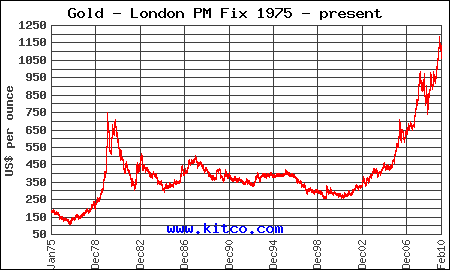Investing in gold is on the tip of many investors’ tongues these days.
The fact that gold has tripled in value over the last seven years and recently has been hovering at a price of $1,100 an ounce, has certainly helped. This is coupled with the realization that gold has outperformed most of the major asset classes over the past several years. But, is this enough evidence to make it worth investing a significant portion of your portfolio in gold?
The uncertainty in the economic environment as a result of the government’s growing deficit has provided the perfect storm for gold’s move to the top of the list for investors. With the risk of heavy inflation and a weaker dollar, people’s fears have driven them toward the implied security that gold can hold during these conditions. To make matters worse, the exaggerated rise in gold since 2003, only compounds investors “being left out” reflex. It’s very difficult to see and hear how an asset class is rising and not want to be a part of it.
Missing Out on Gold?
In our evaluation of assets, we lean toward long-term trends. If you look at a chart of gold prices since 1975 (like the one below), you notice that the price of gold had a similar run in the late seventies hitting a record of $750 an ounce or so in 1980. Moving forward to 1999 the price was closer to the $300 an ounce range. Taking a look at the chart, if you invested in gold in 1980, you would’ve had to wait 27 years just to earn your money back. So make sure you understand where you are in a market cycle, before investing in a specific asset class.
The speculative nature of investing in gold is eerily similar to the speculation that we observed with oil in 2007-2008. With both of these asset classes, there have been multiple reports in the news of how high the prices might rise, which is one of our clearest warning signs for an overheated investment. One of the latest price targets being promoted for gold was that it could rise to $5000 an ounce.
It’s important to remember that gold itself is not a cash-generating asset. It may be tangible, but if you are holding gold it can actually cost you money in the transportation and storage of it. In this article, Vitaliy Katsenelson does a nice job describing the concept of gold as an investment.



